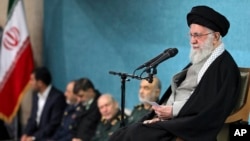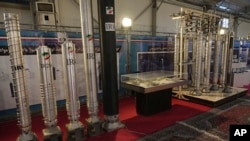
Iranian Supreme Leader Ayatollah Ali Khamenei said he rejects a U.S. push for talks between the two countries because they would be aimed at imposing restrictions on Iranian missile range and its influence in the region.
Speaking to a group of officials on Saturday, Khamenei did not identify the United States by name but said a “bullying government” was being persistent in its push for talks.
“Their talks are not aimed at solving problems, it is for ... let’s talk to impose what we want on the other party that is sitting on the opposite side of the table,” he said.
Khamenei’s remarks came a day after President Donald Trump acknowledged sending a letter to Khamenei seeking a new deal with Tehran to restrain its rapidly advancing nuclear program and replace the nuclear deal he withdrew America from during his first term in office.
Khamenei said U.S. demands would be military and related to the regional influence of Iran.
“They will be about defense capabilities, about international capabilities of the country,” he said. They will urge Iran “not to do things, not to meet some certain people, not to go to a certain place, not to produce some items, your missile range should not be more than a certain distance. Is it possible for anybody to accept these?”
Khamenei, who has final say on all state matters, said such talks would not address solving problems between Iran and the West. Although Khamenei did not name any person or country, he said the push for talks creates pressure on Iran in public opinion.
“It is not negotiation. It is commanding and imposition,” he said.
Trump, in comments to reporters in the Oval Office on Friday, did not mention the letter directly. But he made a veiled reference to possible military action, saying, “We have a situation with Iran that, something’s going to happen very soon. Very, very soon.”
Trump’s overture comes as Israel and the United States have warned they will never let Iran acquire a nuclear weapon, leading to fears of a military confrontation as Tehran enriches uranium at near-weapons-grade levels — something done only by atomic-armed nations.
Tehran has long maintained its program is for peaceful purposes, even as its officials increasingly threaten to pursue the bomb as tensions are high with the U.S. over its sanctions and with Israel as a shaky ceasefire holds in its war against Hamas in the Gaza Strip.
Iran’s accelerated production of near-weapons-grade uranium puts more pressure on Trump. He has repeatedly said he’s open to negotiations with the Islamic Republic while also increasingly targeting Iran’s oil sales with sanctions as part of his reimposed “maximum pressure” policy.
Late in August, Khamenei in a speech opened the door to possible talks with the U.S., saying there is “no harm” in engaging with the “enemy.” However, more recently the supreme leader tempered that, saying that negotiations with America “are not intelligent, wise or honorable,” after Trump floated the possibility of nuclear talks with Tehran.








